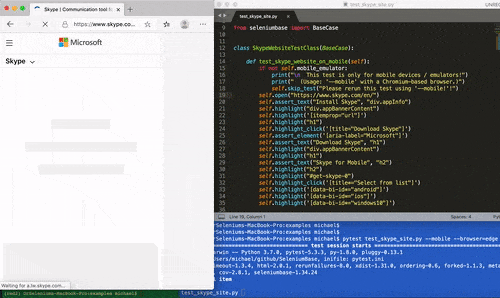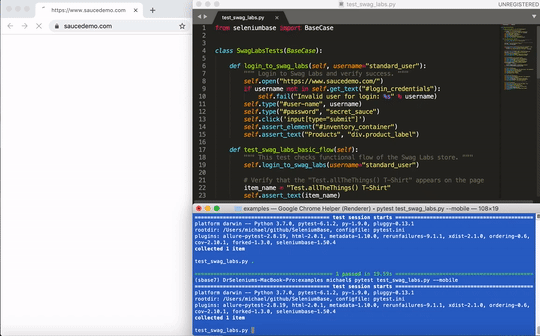Use --mobile to run SeleniumBase tests using Chrome's mobile device emulator with default values for Device Metrics and User-Agent.
Here's an example mobile test:
SeleniumBase/examples/test_skype_site.py
pytest test_skype_site.py --mobileTo configure Device Metrics, use:
--metrics="CSS_Width,CSS_Height,Pixel_Ratio"To configure the User-Agent, use:
--agent="USER-AGENT-STRING"To find real values for Device Metrics, see:
To find real User-Agent strings, see:
Here's another example of a mobile test:
SeleniumBase/examples/test_swag_labs.py
pytest test_swag_labs.py --mobileHere's an example of configuring mobile settings for that test:
# Run tests using Chrome's mobile device emulator (default settings) pytest test_swag_labs.py --mobile # Run mobile tests specifying CSS Width, CSS Height, and Pixel-Ratio pytest test_swag_labs.py --mobile --metrics="360,640,2"# Run mobile tests specifying the user agent pytest test_swag_labs.py --mobile --agent="Mozilla/5.0 (Linux; Android 9; Pixel 3 XL)"For some SeleniumBase Syntax Formats, you can also use mobile=True to run tests in Mobile Mode:
fromseleniumbaseimportDriverdriver=Driver(mobile=True) try: driver.open("https://www.skype.com/en/get-skype/") driver.assert_element('[aria-label="Microsoft"]') driver.assert_text("Download Skype", "h1") driver.highlight("div.appBannerContent") driver.highlight("h1") driver.assert_text("Skype for Mobile", "h2") driver.highlight("h2") driver.highlight("#get-skype-0") driver.highlight_click("span[data-dropdown-icon]") driver.highlight("#get-skype-0_android-download") driver.highlight('[data-bi-id*="ios"]') finally: driver.quit()


